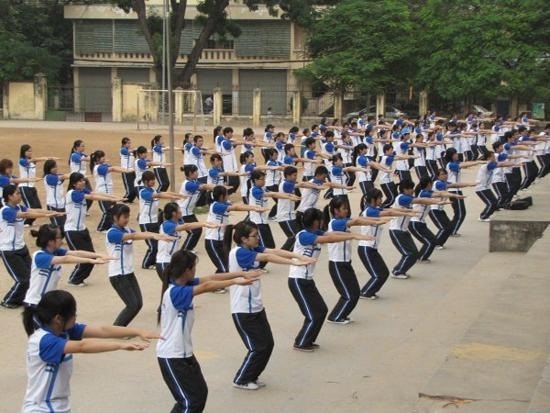 Society
Society

A joint programme on managing and organising physical training and sports activities at schools in the period 2016-20 was signed yesterday by two ministries.
 |
| Students do exercises at a school in Hà Nội. Physical training at schools will be improved to fulfill the targets of stature development of the Vietnamese people. – Photo nhandan.com.vn |
HÀ NỘI — A joint programme on managing and organising physical training and sports activities at schools in the period 2016-20 was signed yesterday by two ministries.
Under the programme, the Ministry of Education and Training (MoET) and the Ministry of Culture, Sports and Tourism will join hands in improving sports activities and physical education, infrastructure and other conditions to promote physical activity at schools.
The two ministries will support each other in management, providing guidance and organising sports activities.
Organisations in the educational, cultural, sports and tourism sectors in different provinces and cities will set up the joint programme based on the principles of the main programme signed by the two ministries.
Every year, the two ministries will conduct an assessment to determine shortcomings and set up detailed plans for the following year.
Speaking on the occasion, minister of education and training Phùng Xuân Nhạ said the signing ceremony was an important event for the education sector because education not only gave students knowledge, but also physical health towards comprehensive development.
Minister Nhạ said implementing physical training at schools was to fulfill the targets of physical and stature development of the Vietnamese people.
“Investment in sports is costly; co-operation between the two ministries will enable them to achieve joint targets and promote sports talent in the country,” he said.
Doctor Lê Thị Hải, former director of the Nutrition Consultancy Centre under the National Nutrition Institute, said the average height of Vietnamese boys was 1.64m and of girls was 1.54m, whereas the average height of young people in foreign countries was 1.75m and 1.65m, respectively. In comparison with other Southeast Asian countries, Vietnamese people were the shortest.
Associate professor Nguyễn Thị Lâm, deputy director of the institute, said one of the reasons was because in other countries the importance of exercising was inculcated at a young age, whereas in Việt Nam, people were even reluctant to walk. As a result, children did not develop an interest in exercise. — VNS




